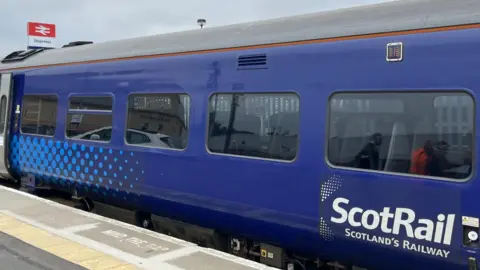ScotRail has embarked on an innovative technological venture by utilizing Elon Musk’s satellite technology to provide Wi-Fi services on trains for the first time in the United Kingdom. This development marks a significant step forward in enhancing the passenger experience by making reliable internet connectivity available while traveling. The initial phase of this program involves a six-month trial period during which six trains operating in northern Scotland will be outfitted with specialized equipment designed for this purpose.
The trains selected for this trial connect popular routes, operating between significant stations such as Inverness to Wick, Thurso, Kyle of Lochalsh, and Aberdeen. By using low Earth orbit (LEO) satellites through the Starlink network, ScotRail aims to deliver a higher standard of onboard connectivity and hopes to replicate this service throughout more of its fleet if the trial proves successful. This initiative is unprecedented in the UK rail industry, highlighting ScotRail’s commitment to staying at the forefront of passenger service improvements.
Should the trial yield positive results, there are plans to expand this technology to the wider fleet, particularly targeting ScotRail’s Class 158 trains, which serve rural areas such as the West Highlands, Stranraer, Dumfries, and the Borders. The goal is not only to enhance existing services but also to influence future train purchases, ensuring that new rolling stock integrates modern communication technologies that meet the needs of today’s travelers.
The partnership with Clarus Networks, which facilitates access to Elon Musk’s Starlink satellites in the UK, underscores the synergy between modern technology and public transport. Business Minister Richard Lochhead expressed optimism, noting that installed reliable internet connections will significantly improve the travel experience for passengers. Additionally, Scott Prentice, ScotRail’s strategy and planning director, voiced hope that this initiative would resolve longstanding connectivity challenges faced by trains traveling through remote regions.
However, it is worth noting that while this innovation has been met with enthusiasm, it also comes in the backdrop of mixed opinions regarding Elon Musk himself. The billionaire entrepreneur and owner of Tesla has had his share of controversies, especially concerning his interactions with Scottish political figures, including clashes with the former Scottish First Minister Humza Yousaf, and current critical sentiments expressed by John Swinney. Such political contexts could influence public perceptions of this partnership and its efficacy.
In drawing a broader perspective, the trial’s implications extend beyond just improving internet access on trains. Many citizens living in rural locations experience marginalization in terms of digital connectivity, often referred to as “digitally isolated.” Hence, the success of this trial could set a precedent for similar technological advancements in other public transport systems across the UK, increasing accessibility to high-speed internet generally in underserved areas. Projects similar to ScotRail’s initiative have emerged, targeting homes, promoting faster broadband to ensure that even the most remote communities can engage with the digital world.
In conclusion, ScotRail’s endeavor to integrate satellite-based Wi-Fi through Elon Musk’s Starlink network into its services exemplifies a significant leap towards modernizing rail travel in Scotland. This initiative not only promises to enhance passenger experience on selected routes but could potentially catalyze a broader transformation in connectivity across the public transport sector, setting an example for other regions seeking to close the digital divides present in rural transportation services. As the trial progresses, stakeholders will be closely monitoring its outcomes, hoping for a successful shift towards a more connected journey experience.



